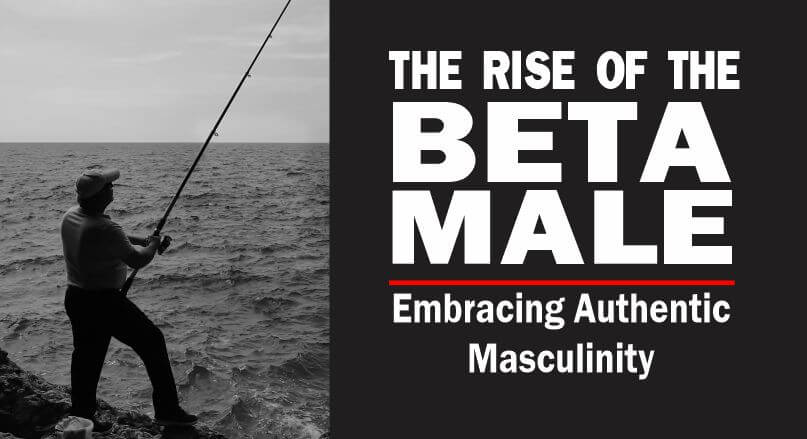Last updated on May 23rd, 2024 at 02:53 am
Beta males are the most misunderstood type of men in recent times, but they do not care, because they know that healthy masculinity thrives on inner strength.
The phrase, suggests a person who is not confident or assertive, and who may lack traditional masculine traits.
But is there really one “correct” way to be a man?
While the term is often used in a negative way, the concept of beta males and how they fit into modern society is complex and deserving of scrutiny.
In this extensive blog post, we will explore this perceived soft man – where the term came from, what it means, and whether or not it is a useful or harmful label.
Let’s delve into the world of masculinity and challenge our assumptions about what it means to be a man.
Table of Contents
- Beta Male Definition
- The Socio-Sexual Hierarchy
- Characteristics of a Beta Male
- Advantages of Being a Beta Male
- Misconceptions About Beta Males
- The Dark Side of Beta Males
- Beta Male Stereotypes
- Examples of Beta Males in History
- How to Embrace Your Beta Side
- Conclusion
Beta Male Definition
Beta male is a term that is often talked about in the context of dating and masculinity. It describes a man who is perceived as weak or submissive, compared to the alpha male archetype.
These men are often seen as being less assertive, less powerful, and less successful than their alpha male counterparts.
They are often described as being shy, introverted, and sensitive, and may be perceived as lacking confidence or ambition. Betas are often seen as being “nice guys” who finish last in life and love.
However, this definition is problematic for several reasons. First, it implies that there is only one way to be a man: the alpha male way.
This idea reinforces harmful gender stereotypes that limit men’s behavior and perpetuate toxic masculine norms.
Second, it is not a holistic portrayal of men’s complexity.
Some men are inherently less likely to exhibit traditional “alpha male” traits, but it’s not a result of weakness or a lack of masculinity.
It ignores the fact that there is a range of masculine behaviors and characteristics and that not everyone has to fit into a narrow or compact mold.
Also, the beta concept often ignores the positive aspects of being sensitive or empathetic.
Studies have found that men who express vulnerability are more likely to have healthy and fulfilling relationships, better emotional intelligence, and stronger mental health.
Related: Negative Signs Of A Beta Male In Relationships
In contrast, men who suppress their emotions may be more likely to experience depression, anxiety, and difficulty in relationships.
As society becomes more aware of the limitations of stereotypical gender roles, we need to open up new possibilities for men to express themselves in ways that are both healthy and true to their identity.
Rather than shaming men for not fitting into narrow definitions of masculinity, we should embrace the differences in personality, temperament, and behavior that make each person unique.
The Origins and History of the Beta Male Term
The origins of the term are not entirely clear, and its meaning has evolved over time.
One possible source of the term comes from studies of animal behaviour, particularly among primates.
In many primate societies, there is a hierarchy of dominance, with the strongest and most aggressive males occupying the highest positions.
Other males, who are less dominant or aggressive, are relegated to lower positions in the hierarchy. These less dominant males are sometimes referred to as “beta.”
Related: Alpha Male Vs Beta Male: Why Compare Men?
The term first gained widespread use in the context of the “pick-up artist” (PUA) community in the early 2000s.
In this context, “beta” was used to describe men who were unsuccessful with women and lacked the confidence and assertiveness that PUAs claimed were necessary to attract women.
Over time, it has taken on a more general meaning and is now often used to describe men who are perceived as less dominant or less masculine than others.
Some men have embraced the term as a way of rejecting traditional notions of masculinity and embracing a more egalitarian approach to relationships and social interaction.
However, the term has also been criticized for promoting harmful stereotypes and perpetuating toxic masculinity.
Some argue that the concept is based on flawed assumptions about gender and power and that it reinforces harmful gender norms that limit men’s emotional expression and perpetuate inequality.

The Socio-Sexual Hierarchy
The socio-sexual hierarchy categorizes individuals based on sexual success, often portraying “alpha males” as confident and successful. However, it’s criticized for promoting toxic masculinity and reinforcing harmful stereotypes.
This hierarchy may lead to feelings of inadequacy. While some argue its usefulness, it reflects societal gender norms. Rejecting stereotypes and embracing diversity is key for positive change.
Related: The Unspoken Struggles Of Beta Males And How They Can Overcome
Characteristics of a Beta Male
While the term beta may seem negative, it is not meant to be insulting.
Instead, it is a term that describes a particular set of characteristics and traits that many people exhibit.
Here are the characteristics:
1. Empathy
One of the most defining characteristics of betas is their greater sense of empathy. For me, this is a positive one and represents humanity.
This is a trait that is often associated with women, but more and more men are beginning to understand its importance.
They are often more in touch with their emotions and the emotions of others, and they can connect with people on a deeper level.
They are the type of men who are always sensitive to the needs and feelings of others and are always ready to lend a helping hand or offer support.
2. Compassion
Due to their strong sense of empathy, betas are naturally compassionate. They are the type of men who are always willing to put themselves in the shoes of others, and they often go out of their way to make people happy.
They understand that everyone has their struggles, and they are always looking for ways to help others overcome their challenges.
3. Humility
Another key characteristic of betas is their humility. They do not feel the need to be the center of attention or to be praised for their accomplishments.
Instead, they are happy to work behind the scenes and make a difference in people’s lives in their own quiet way. They often make good quiet leaders.
They understand that everyone has their strengths and weaknesses, and they do not judge or criticize others based on their own beliefs or experiences.
4. Emotional Intelligence
In a world where empathy is on the decline and people are becoming more selfish, being competent in emotional literacy is an advantage.
They are known for their emotional intelligence, which is their ability to understand, regulate and manage their emotions in healthy ways.
Emotional intelligence is a critical component of success in life and relationships because it allows people to connect with others and maintain healthy relationships.
They are skilled in this area and can use their emotional intelligence to navigate social situations and relationships more effectively.
Related: 5 Reasons Why Women Love Beta Males As Partners
5. Respectful
Betas are known for their deep respect and appreciation for others.
They understand that everyone deserves to be treated with respect, regardless of their gender, age, race, religion, or background.
They are always willing to listen to others and learn from different perspectives, and they always treat others with kindness and compassion.
6. More Introverted
In the context of the beta male stereotype, introversion is seen as a weakness or a lack of assertiveness.
As they are portrayed as less dominant or less confident than their more assertive counterparts, their introversion may be seen as a contributing factor to their perceived lack of social success.
However, it’s important to recognize that introversion is not inherently negative or indicative of weakness.
Many successful and accomplished people, including leaders and entrepreneurs, identify as introverts.
Introversion is simply one aspect of personality, and it does not determine a person’s social or professional success.
7. Low Levels of Testosterone
Low testosterone is seen as a contributing factor to a man’s perceived lack of assertiveness, physical strength, or sexual prowess and this could be the case with the beta.
They may be seen as less masculine or less desirable to potential partners because of their low testosterone levels.
However, it’s worth pointing out that testosterone levels are not necessarily indicative of a person’s character or social success.
Many successful and accomplished people, including leaders and entrepreneurs, may have naturally lower levels of testosterone or may experience low levels due to factors such as aging or health conditions.
Additionally, masculinity and social success are complex and multifaceted concepts that cannot be reduced to a single biological marker.
8. More Cooperative
If we consider “cooperative” as a characteristic of the beta, it may be seen as a contrast to the more stereotypically alpha traits of aggression and dominance.
Betas are perceived as more willing to collaborate with others and less interested in competing for power or status.
This could manifest in a variety of ways, such as being more willing to compromise or negotiate in social or professional situations.
Related: The Enduring Appeal Of Beta Male Traits And Characteristics
However, it’s important to also know that the concept itself is controversial and subjective and that there is no one definitive set of characteristics that define a beta.
Additionally, the idea that cooperation is inherently less desirable than competition or dominance is a narrow and limiting perspective that does not accurately reflect the complexities of human behavior and social interaction.
Cooperation and collaboration are important qualities in many contexts and can contribute to individual and collective success in a variety of settings.

Advantages of Being a Beta Male
1. Better at Building Relationships
The beta archetype excels in relationship-building due to higher emotional intelligence and empathy. Their self-awareness helps in emotional regulation and expression.
They’re attuned to others’ feelings, making them empathetic listeners and communicators. Empathy fosters trust and respect, leading to meaningful connections.
Their collaborative approach encourages open, honest communication and mutual respect, enhancing rapport.
2. Better Listeners
Betas excel in listening due to high empathy and emotional intelligence. They prioritize others, understanding perspectives and responding empathetically.
Their openness promotes trust and encourages sharing. Regulation of their emotions enhances focused listening by reducing distractions.
3. Less Likely to Be Aggressive or Violent
They exhibit lower testosterone levels and lesser interest in domination, leading to reduced aggression. Testosterone often links to alpha male assertiveness and dominance.
Betas are reserved, valuing win-win solutions and calm conflict resolution. Their emotional intelligence curbs anger, encouraging rational responses over violence.
4. More Likely to Be Supportive
They offer strong support due to their empathy and nurturing nature. They prioritize harmony and well-being, rather than dominance.
Their adept communication skills enable them to understand and respond to others’ needs and concerns, making them reliable sources of support and encouragement.
Misconceptions About Beta Males
They are often misunderstood and subjected to a number of misconceptions, which can be harmful and unfair.
These misconceptions stem from the stereotype that the ideal man is one who is dominant, aggressive, and assertive.
However, this narrow view of masculinity ignores the many positive traits that beta males possess.
Here are the common misconceptions:
1. They are Weak and Passive
One of the most common misconceptions about beta males is that they are weak and passive.
This is far from the truth. Beta males may not be as assertive as alpha males, but that does not make them weak.
In fact, many betas possess great inner strength and resilience and are able to weather challenges and setbacks with grace and dignity.
2. They are not Successful
Another misconception about beta males is that they are not successful. This is also untrue. This is also not true.
They may not be as competitive as alpha males, but that does not mean they are not successful.
Many are highly accomplished in their careers and personal lives and are able to achieve their goals through collaboration and teamwork.
3. They are not Attractive
Betas are often seen as less attractive than alpha males, but this is also a misconception.
Many women find betas attractive because of their kind and caring nature, their ability to listen and communicate effectively, and their willingness to be vulnerable and emotionally expressive.
4. They are not Masculine
There is a misconception that beta males are not masculine. This could not be further from reality.
They possess many of the same traits that are often associated with traditional masculinity, such as physical strength, courage, and self-reliance.
However, they also possess other traits that are less valued in traditional masculinity, such as empathy, emotional intelligence, and a willingness to collaborate and communicate.
5. They are not Leaders
Another misconception is that they are not leaders. Betas can be highly effective leaders because of their ability to listen to and empathize with others.
Also, they have the inherent willingness to collaborate and seek win-win solutions, and their ability to motivate and inspire people around them through their own examples.
The Dark Side of Beta Males
While this category of men has many positive traits that make them valuable members of society, there is also a darker side to this personality type that can manifest in destructive ways.
Here are some examples of the dark side of the beta:
1. Passive-Aggressiveness
They are often known for their agreeable nature and their desire to avoid confrontation.
However, this can lead to a pattern of passive-aggressiveness, where they express their anger or frustration indirectly through sarcasm, backhanded compliments, or other subtle forms of communication.
This can be damaging to relationships, as it creates an atmosphere of tension and distrust.
2. Self-Doubt
They often struggle with self-doubt, which can prevent them from taking risks and pursuing their goals.
They may be hesitant to assert themselves or take on leadership roles, fearing that they are not qualified or that they will fail.
This can limit their potential and prevent them from achieving their full potential.
3. Indecisiveness
Betas may also struggle with making decisions, as they tend to weigh multiple options and consider the opinions of others before coming to a conclusion.
This can lead to indecisiveness and a lack of assertiveness, which can be frustrating for those around them.
4. Over-Apologizing
They may be prone to over-apologizing, even when they are not at fault. This can create a dynamic where they are constantly seeking the approval of others and feeling guilty for their own needs and desires.
This can be exhausting for both the beta and those around them.
5. Resentment
He may also be prone to feelings of resentment, particularly towards those whom they perceive as more dominant or successful.
This can lead to feelings of envy and bitterness, which can poison relationships and prevent him from experiencing true happiness and fulfillment.
6. Can Be Taken Advantage Of
They exhibit agreeable and cooperative traits in social interactions, fostering positive relationships. However, these qualities may expose them to exploitation.
Their lack of assertiveness and prioritization of others’ needs can lead to vulnerability. Additionally, their desire for approval makes them susceptible to manipulation using praise and compliments.
7. Can Struggle to Set Boundaries
Beta males may face boundary-setting challenges due to prioritizing others’ needs, fearing guilt or selfishness. Low confidence and self-esteem hinder asserting themselves, fearing rudeness or rejection.
Societal gender roles pressure conformity, contributing to struggles in defying alpha norms, causing shame or inadequacy.
8. Can Experience Self-Esteem Issues
They might experience self-esteem issues due to comparisons with more dominant individuals, feeling inadequate against societal masculinity norms.
They might not be taken seriously or respected due to passive behavior, leading to powerlessness. Past negative feedback about sensitivity or passivity could contribute to shame and inadequacy.
Beta Male Stereotypes
1. The Nice Guy
The “Nice Guy” label describes men who expect romantic attention for their kindness, feeling frustrated by rejection.
As a stereotype, they lack the confidence and assertiveness associated with alpha males. Passive and needy traits can be unattractive to women seeking confidence.
The stereotype can reinforce harmful notions about women’s preferences. Healthy relationships rely on respect, communication, and consent, not entitlement based on kindness.
2. The Friend Zone
The friend zone refers to one-sided romantic feelings in a friendship. As a beta archetype, it portrays men as passive, weak, and lacking assertiveness, pursuing romance through friendship.
This idea assumes women prefer dominance. It’s harmful, perpetuating unrealistic expectations and dismissing respectful boundaries and genuine friendships in favor of aggressive pursuit.
3. The Doormat
The doormat refers to a passive, submissive person often associated with beta stereotypes. They prioritize pleasing their partner over asserting needs, leading to perceived weakness.
They struggle to stand up for themselves or express opinions, reinforcing harmful notions that men must always be dominant, suppressing empathy and self-care.
Examples of Beta Males in History
Here are some examples of men who may fit the description of the beta based on their historical personas and social status:

- Albert Einstein: Although he was a brilliant physicist who revolutionized the field of science, Einstein was known for his pacifist beliefs and was often seen as meek and unassuming in his personal life. He was a celebrated introvert who dedicated all his time to looking for something to discover. Portrait by Ferdinand Schmutzer.

- Charles Darwin: Darwin is widely regarded as one of the most respected, influential, and popular scientists in history. He was a very quiet, shy, and introverted person who struggled with anxiety and depression. Despite his exploits, he was not the loud type and always wanted to enjoy his solitude. Photo Credit: Wikipedia.

- Franz Kafka: The author of “The Metamorphosis” and other seminal works of literature was known for his quiet demeanor and introspective personality. He was a Bohemian novelist who spoke German and was a short-story writer who was based in Prague. He is widely regarded as one of the major figures of 20th-century literature. Photo Credit: Wikipedia.

- Vincent van Gogh: The famous painter was often seen as an eccentric outsider during his lifetime and struggled with mental illness. He was Dutch and posthumously became one of the most influential persons in Western Art in history.
- Photo Credit: Art Institute of Chicago.

- Mahatma Gandhi: The Indian leader and advocate for nonviolent resistance was known for his humility and peaceful approach to activism. He applied nonviolent resistance to lead a successful campaign for India’s independence from the British grip. Photo Credit: Wikipedia.
It’s worth noting that these men may not necessarily fit the negative connotations often associated with the beta. They were all highly accomplished individuals who made significant contributions to their respective fields.
How to Embrace Your Beta Side
1. Embrace Your Empathy
As a beta, you likely have a heightened sense of empathy and emotional intelligence.
Use this to your advantage by developing strong relationships with those around you.
Be a good listener, offer support, and show compassion to those in need.
These traits will help you build strong connections with others and earn their respect.
2. Be Confident in Your Abilities
Just because you’re not an alpha male doesn’t mean you’re not capable of achieving great things.
Believe in your abilities, and don’t let anyone tell you otherwise or make you feel you are less of a man.
Remember that confidence comes from within, and it’s important to cultivate a sense of self-worth that isn’t dependent on external validation.
3. Speak Your Mind
While betas may be less confrontational than their alpha counterparts, that doesn’t mean they should stay silent.
Speak your mind and share your thoughts and opinions, even if they differ from those around you.
Remember that diversity of thought is valuable, and your unique perspective can add a lot to any conversation.
4. Find Your Tribe
Finally, it’s important to find a community of people who appreciate and value you for who you are.
Seek out like-minded individuals who share your values and interests, and surround yourself with people who lift you up and support you.
Having a strong support system can make all the difference when it comes to embracing your personality as a beta.
Conclusion
The beta male concept describes men with traits linked to submissiveness and lack of assertiveness. Masculinity is diverse, and self-expression should be authentic.
Embracing the beta male label can be empowering. Introversion and non-aggression don’t imply weakness; they can be assets in collaboration and relationships.
You’re not alone; successful men share these traits. Seek role models and peers for support and community, embracing your unique qualities and perspectives.
Frequently Asked Questions
What is a beta male?
He is a man who exhibits personality traits that are traditionally associated with submissiveness, shyness, or lack of assertiveness.
Is being a beta male a bad thing?
No, being a beta male is not inherently a bad thing. It is simply a different expression of masculinity than what is traditionally considered “alpha” or dominant.
Can beta males be successful?
Yes, they can be successful in many different areas of life, including relationships, careers, and personal growth.
How can beta males embrace their personality traits?
They can embrace their personality traits by recognizing that there is no one-size-fits-all definition of masculinity, finding role models and peers who share their values and perspectives, and cultivating a sense of confidence and purpose that allows them to thrive in all areas of life.
Is the concept of beta males harmful?
The concept of beta males can be harmful if it reinforces harmful stereotypes or pressures men to conform to narrow definitions of masculinity. However, it can also be a useful way to describe certain personality traits and behaviors.
Can beta males be assertive?
Yes, they can be assertive when necessary. Assertiveness is a skill that can be learned and practiced, regardless of one’s personality type.
How can society support beta males?
Society can support beta males by promoting a more inclusive and equitable definition of masculinity that values individuals for their unique qualities and contributions, rather than their conformity to narrow definitions of gender roles.
REFERENCES
- Move Over, Alpha Males. Why Being a Beta May Be Better
- 20 Virtues and Flaws of a Beta Male
- https://www.beverlyhillsmagazine.com/6-things-to-know-about-being-a-beta-male/
- https://fastercapital.com/keyword/beta-males.html
- https://www.senseorient.com/beta-male/
- https://fastercapital.com/topics/embracing-your-beta-male-identity.html
- https://sites.psu.edu/pennstatercl/the-rise-of-the-beta-male/
Pyo Merez (PsyD) is a distinguished adolescent and adult psychologist at the forefront of mental health advocacy.
With expertise in cognitive and developmental psychology, focusing on social relationships, cultural contexts, and individual differences, Pyo has dedicated his career to empowering adolescents and adults.
As a sought-after speaker and panelist, Pyo shares invaluable insights on issues affecting young people, contributing to a deeper understanding of mental health and well-being in today's society.


